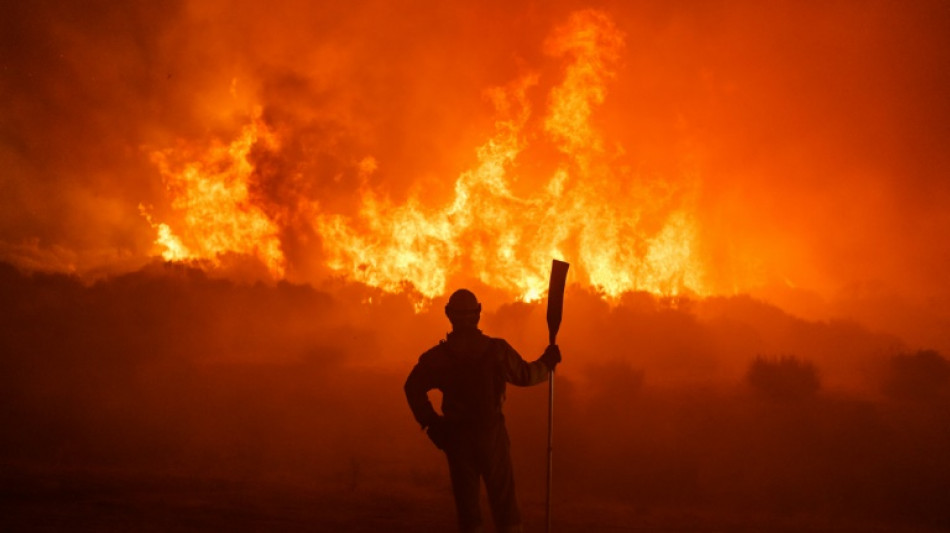
-
 Zelensky vows overhaul of Ukraine's scandal-hit energy firms
Zelensky vows overhaul of Ukraine's scandal-hit energy firms
-
South Africa defy early red card to beat Italy

-
 Alex Marquez claims Valencia MotoGP sprint victory
Alex Marquez claims Valencia MotoGP sprint victory
-
McIlroy shares lead with Race to Dubai title in sight

-
 Climate protesters rally in Brazil at COP30 halfway mark
Climate protesters rally in Brazil at COP30 halfway mark
-
Spike Lee gifts pope Knicks jersey as pontiff meets film stars

-
 BBC caught in crossfire of polarised political and media landscape
BBC caught in crossfire of polarised political and media landscape
-
'Happy' Shiffrin dominates in Levi slalom for 102nd World Cup win

-
 Palestinian national team on 'mission' for peace in Spain visit
Palestinian national team on 'mission' for peace in Spain visit
-
Brazilian 'Superman' cheers child cancer patients in Ghana

-
 India close in on win over South Africa after Jadeja heroics
India close in on win over South Africa after Jadeja heroics
-
Huge explosions rock industrial area near Argentina's capital

-
 Bezzecchi takes pole for Valencia sprint and MotoGP
Bezzecchi takes pole for Valencia sprint and MotoGP
-
Dominant Shiffrin leads after first slalom run in Levi

-
 Nine killed in accidental explosion at Indian Kashmir police station
Nine killed in accidental explosion at Indian Kashmir police station
-
Climate protesters to rally at COP30's halfway mark

-
 Fighting South Africa lose Rickelton after India 189 all out
Fighting South Africa lose Rickelton after India 189 all out
-
Harmer leads South Africa fightback as India 189 all out

-
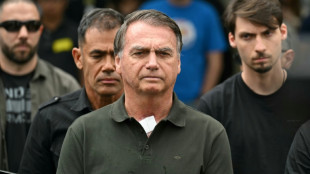 Prison looms for Brazil's Bolsonaro after court rejects his appeal
Prison looms for Brazil's Bolsonaro after court rejects his appeal
-
EU bows to pressure on loosening AI, privacy rules

-
 India close in on lead despite South African strikes
India close in on lead despite South African strikes
-
Curry's 49 points propel Warriors in 109-108 win over Spurs

-
 NZ boxer Parker denies taking banned substance after failed test
NZ boxer Parker denies taking banned substance after failed test
-
Australia setback as Hazlewood ruled out of 1st Ashes Test

-
 Australia pace spearhead Josh Hazlewood ruled out of 1st Ashes Test
Australia pace spearhead Josh Hazlewood ruled out of 1st Ashes Test
-
UN Security Council to vote Monday on Trump Gaza plan
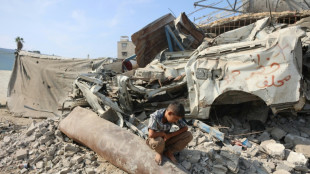
-
 Japan's Tomono leads after men's short program at Skate America
Japan's Tomono leads after men's short program at Skate America
-
China tells citizens to avoid Japan travel as Taiwan row grows

-
 Purdue Pharma to be dissolved as US judge says to approve bankruptcy
Purdue Pharma to be dissolved as US judge says to approve bankruptcy
-
Iran's first woman orchestra conductor inspires

-
 Wood gets all-clear in boost for England
Wood gets all-clear in boost for England
-
Golf's world No. 8 Thomas has back surgery

-
 Rebooted Harlem museum celebrates rise of Black art
Rebooted Harlem museum celebrates rise of Black art
-
'Desperation in the air': immigrant comics skewer Trump crackdown

-
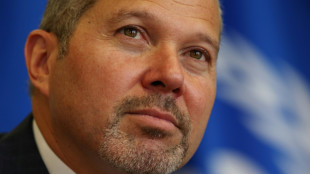 UN regulator says shipping still wants to decarbonize -- despite US threats
UN regulator says shipping still wants to decarbonize -- despite US threats
-
Grant, Kim share halfway lead in LPGA Annika tournament

-
 Musk's Grokipedia leans on 'questionable' sources, study says
Musk's Grokipedia leans on 'questionable' sources, study says
-
Trump signs order to lower tariffs on beef, coffee, other goods

-
 Croatia qualify for 2026 World Cup, Netherlands close, Germany in limbo
Croatia qualify for 2026 World Cup, Netherlands close, Germany in limbo
-
'Last Chance U' coach dies after shooting: US police
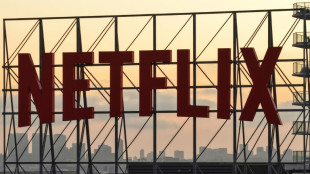
-
 Sinner completes perfect ATP Finals group stage, Auger-Aliassime reaches last four
Sinner completes perfect ATP Finals group stage, Auger-Aliassime reaches last four
-
Woltemade sends Germany past Luxembourg in World Cup qualifier

-
 Croatia qualify for 2026 World Cup with 3-1 win over Faroes
Croatia qualify for 2026 World Cup with 3-1 win over Faroes
-
Kai Trump makes strides but still misses cut in LPGA debut

-
 Return to bad days of hyperinflation looms in Venezuela
Return to bad days of hyperinflation looms in Venezuela
-
US airspace recovers as budget shutdown ends

-
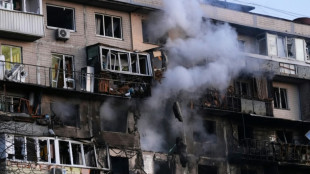 Russia strike on Kyiv apartment block kills six, Ukraine says
Russia strike on Kyiv apartment block kills six, Ukraine says
-
Arrest made in shooting of 'Last Chance U' coach: US police
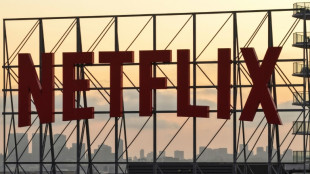
-
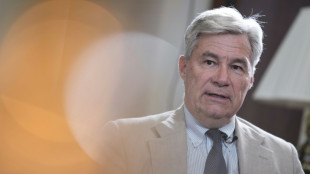 At COP30, senator warns US 'deliberately losing' clean tech race with China
At COP30, senator warns US 'deliberately losing' clean tech race with China
-
US, Switzerland say deal reached on trade and tariffs
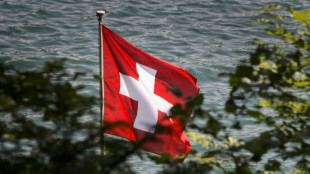

World must brace for more extreme wildfires: UN
The number of major wildfires worldwide will rise sharply in coming decades due to global warming, and governments are ill-prepared for the death and destruction such mega-blazes trail in their wake, the UN warned Wednesday.
Even the most ambitious efforts to curb greenhouse gas emissions will not prevent a dramatic surge in the frequency of extreme fire conditions, a report commissioned by the UN Environment Programme (UNEP) concluded.
"By the end of the century, the probability of wildfire events similar to Australia's 2019–2020 Black Summer or the huge Arctic fires in 2020 occurring in a given year is likely to increase by 31–57 percent," it said.
The heating of the planet is turning landscapes into tinderboxes, and more extreme weather means stronger, hotter and drier winds to fan the flames.
Such wildfires are burning where they have always occurred, and are flaring up in unexpected places such as drying peatlands and thawing permafrost.
"Fires are not good things," said co-author Peter, an expert in forest fire management at the UN's Food and Agriculture Organization (FAO).
"The impacts on people -- socially, health-wise, psychologically -- are phenomenal and long-term," he told journalists in a briefing.
Large wildfires, which can rage uncontrolled for days or weeks, cause respiratory and heart problems, especially for the elderly and very young.
A recent study in The Lancet concluded that exposure to wildfire smoke results, on average, in more than 30,000 deaths each year across 43 nations for which data was available.
Economic damages in the United States -- one of the few countries to calculate such costs -- have varied between $71 to $348 billion (63 to 307 billion euros) in recent years, according to an assessment cited in the report.
- Zombie fires -
Major blazes can also be devastating for wildlife, pushing some endangered species closer to the brink of extinction.
Nearly three billion mammals, reptiles, birds and frogs were killed or harmed, for example, by Australia's devastating 2019-20 bushfires, scientists have calculated.
Wildfires are made worse by climate change.
Heatwaves, drought conditions and reduced soil moisture amplified by global warming have contributed to unprecedented fires in the western United States, Australia and the Mediterranean basin just in the last three years.
Even the Arctic -- previously all but immune to fires -- has seen a dramatic increase in blazes, including so-called "zombie fires" that smoulder underground throughout winter before bursting into flames anew.
But wildfires also accelerate climate change, feeding a vicious cycle of more fires and rising temperatures.
Last year, forests going up in flames emitted more than 2.5 billion tonnes of planet-warming CO2 in July and August alone, equivalent to India's annual emissions from all sources, the European Union's Copernicus Atmosphere Monitoring Service (CAMS) reported.
Compiled by 50 top experts, the report called for a rethink on how to tackle the problem.
"Current government responses to wildfires are often putting money in the wrong places," investing in managing fires once they start rather than prevention and risk reduction, said UN Environment chief Inger Andersen.
"We have to minimise the risk of extreme wildfires by being prepared."
E.AbuRizq--SF-PST


